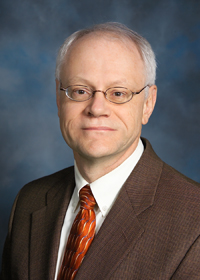 |
Steven Hinrichs, M.D. |
He and 19 others were invited to present at the Workshop on Research Priorities in Emergency Preparedness and Response for Public Health Systems on Dec. 19 in Washington.
The IOM is a component of the National Academy of Sciences and is responsible for enlisting distinguished members of professions to examine public health policy matters. It advises the federal government on issues of medical care, research and education.
Dr. Hinrichs participated in a four-member panel discussion on improving information management with the goal of providing perspective on future research needs of the nation.
“It was a very formal proceeding and provided important insights into how new science projects are developed,” Dr. Hinrichs said.
The workshop was part of the response to recent federal legislation titled the “Pandemic and All Hazards Preparedness Act,” which established an immediate and critical need to define research priorities for emergency preparedness and response.
The Centers for Disease Control and Prevention’s (CDC) Coordinating Office for Terrorism Emergency Preparedness and Response asked the IOM to conduct a fast-track study. It is expected that a significant amount of the funds will flow to Centers for Public Health Preparedness at schools of public health.
The legislation directed the CDC to support the most promising opportunities to improve public health systems responsible for emergency preparedness and response for catastrophic events.
Dr. Hinrichs, who is director of the Nebraska Public Health Laboratory and director of the Center for Biosecurity at UNMC, presented on improving information management, specifically in the area of laboratory data and Internet-based medical records.
The group also discussed issues related to President Bush’s directive for an electronic medical health record system for all Americans by 2014, he said.
“In order to get this system in place, you have to address research questions in informatics,” Dr. Hinrichs said. “The committee wanted to know where the gaps in capability are and what research would have the greatest return on investment. The question is what is it going to take to achieve the goal. As everyone knows, given enough resources, we can go to the moon.”
Based on expert input, the IOM panel will make recommendations to the federal government on which areas should be the highest priorities to fund. Agencies to which funds will flow then will be identified, followed by requests for grant funding.
Dr. Hinrichs said UNMC is positioning itself to secure some of the grants.
“It’s a distinct advantage to be involved in the process from the start. It gives us a year to prepare a proposal. That’s why this activity is so important,” Dr. Hinrichs said.
He was chosen in part for his active role nationally in the research and application of informatics. He serves on a number of U.S. Health and Human Services System advisory panels for the future of informatics, as well as the National Governors Association Health Information Communication and Data Exchange Taskforce, and the Department of Homeland Security Stakeholder Panel on Agent Detection Assays.
He and his UNMC colleagues have been involved in various informatics projects in regards to emergency preparedness and response for public health systems. Among them, a Web-based Personal Health Record program for UNMC students, and bioterrorism and influenza surveillance projects in collaboration with the Peter Kiewit Institute.
“The Personal Health Record project is just one example of what UNMC is doing to improve our capability and visibility,” Dr. Hinrichs said. “The goal of electronic data exchange is to achieve interoperability so information can be transferred and accessed when appropriate. You could transfer information to those you give permission to access — such as providing your last blood pressure measurement to an emergency room physician, or a list of current medications your grandmother is taking when you bring her to your family physician”
The IOM will use its findings to identify research opportunities and a list of three to five top-priority research areas. It will deliver a letter report this month.